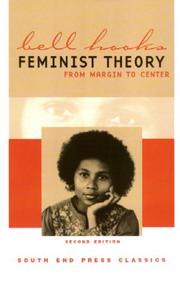
Feminist theory
By Bell Hooks, Noomi B. Grüsig, Nassira Hedjerassi
Subjects: Feminist theory, Afro-amerikanska kvinnor, Teoría feminista, 305.4/2/0973, Marginaliteit, Attitudes, Féminisme, Feminismus, African American women, Marginaux, Feminism--evaluation, Afro-American women, Théorie féministe, Evaluation, Feminism, Marginalidad social, Minority Studies, Verenigde Staten, open_syllabus_project, Noires américaines, Frau, Love, Soziale Situation, Hq1426 .h675 1984, Feminisme, SOCIAL SCIENCE, Umschulungswerkstätten für Siedler und Auswanderer, Theorie, Feministisk teori, African american women--attitudes, Marginalité, Évaluation, Einstellung, Social Marginality, Negers, Mujeres en EE. UU, African american women, Marginality, social--united states, Discrimination & Race Relations, Feminism--united states--evaluation, Frauenbewegung, Marginality, social, Schwarze
Description: A sweeping examination of the core issues of sexual politics, bell hooks' new book Feminist Theory: from margin to center argues that the contemporary feminist movement must establish a new direction for the 1980s. Continuing the debates surrounding her controversial first book, Ain't I A Woman, bell hooks suggests that feminists have not succeeded in creating a mass movement against sexist oppression because the very foundation of women's liberation has, until now, not accounted for the complexity and diversity of female experience. In order to fulfill its revolutionary potential, feminist theory must begin by consciously transforming its own definition to encompass the lives and ideas of women on the margin. Hooks' work is a challenge to the women's movement and will have profound impact on all whose lives have been touched by feminism and its insights.
Comments
You must log in to leave comments.